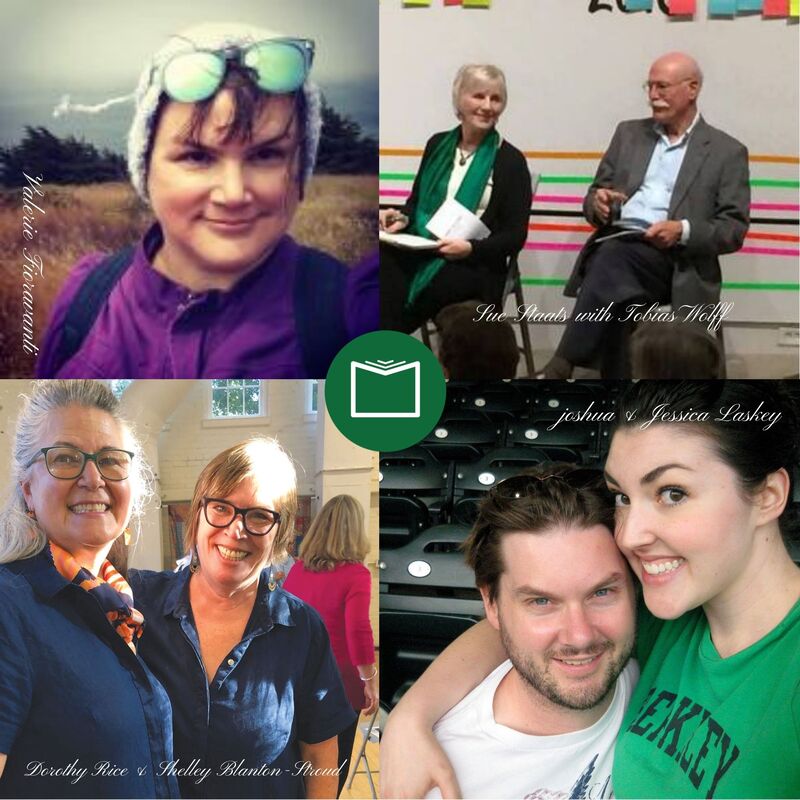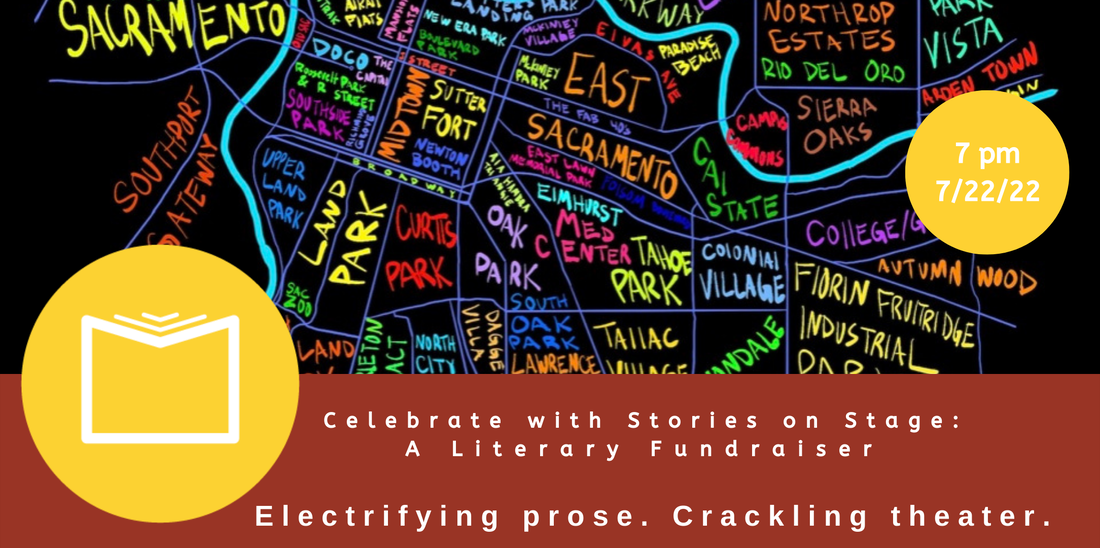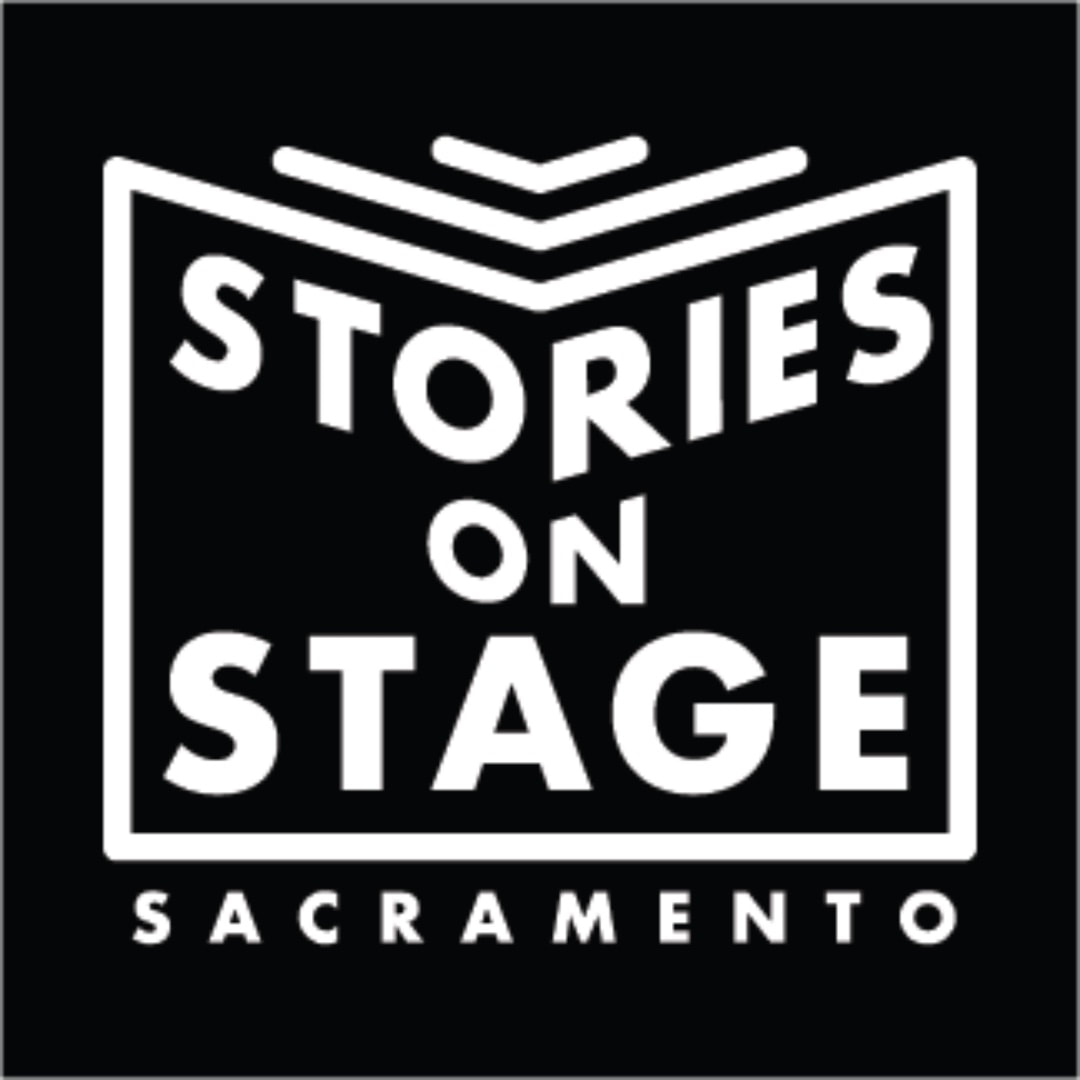Sue Staats interviews SOSS founder Valerie Fioravanti, herself, the current co-directors and the next generation ...On this, Stories on Stage Sacramento’s thirteenth year, we’re taking a mid-season opportunity to celebrate the writers, stories, and actors who have made this unique series such a huge success. And what better time to interview the people who have helmed the event – from the founder, Valerie Fioravanti, through the people who have nurtured and grown Stories on Stage, Sue Staats, Shelley Blanton-Stroud, and Dorothy Rice, to the couple who will be taking over its direction beginning in 2023, Jessica and Joshua Laskey—than right now! It’s truly the past, present, and future of fourteen years of electrifying prose and crackling theatre, and it all began with Valerie Fioravanti, who, in 2009, saw a need and filled it.
Sue: Valerie, let’s begin at the beginning. What was the spark? Why did you start Stories on Stage? Valerie: A few months after I moved here, I was invited to a meeting to discuss the state of the literary arts in Sacramento. What I heard was overwhelmingly critical, and I came away with a sense that I wanted to challenge that negativity. The person who called the meeting was Bob Stanley, then President of the Sacramento Poetry Center and Poet Laureate of Sacramento. He told me he would support any effort I made to enhance our community, and the Sacramento Poetry Center became Stories on Stage’s first home. Sue: What are you most proud of about Stories on Stage? Valerie: I’m proud that it fulfilled its original purpose and changed the notion that writing wasn’t valued or supported in Sacramento. We brought writers and readers together. We flashed a spotlight upon our talented theater community. We met and became a community in the moments shared between stories. Sue: What was your biggest challenge? Valerie: Running Stories on Stage was truly a labor of love. I met so many talented, generous writers, actors, and lovers of theater and literature. It filled my heart to see it thrive. But starting the series was a reaction rather than a well-planned decision. I struggled to find the time to manage the series and my other responsibilities as a writer, teacher, and editor. I was always so aware that I didn’t have enough time in my days to encourage its growth and evolution, as you did, and Shelley and Dorothy continue to do. Sue: How did the event change from when you started it, after you passed it on to me, four years later? Valerie: We grew, of course. Writers with forthcoming books contacted us, instead of the other way around. I have to say I love how much the series has remained true to the original concept even though it’s changed hands twice now. Sue: How would you finish this sentence: "The best thing about Stories on Stage is…” Valerie: Well, doesn’t everyone come for your cookies? I know I always reach for seconds, or thirds! And then, four years later, in 2013, I took over the running of Stories on Stage. By then, with the founding of our sister series in Davis, also called Stories on Stage, we needed to differentiate. Just plain Stories on Stage became Stories on Stage Sacramento. (Note: interviewing yourself is decidedly odd and not as easy as I thought it would be. For purposes of clarity I will call myself Sue Q (questioner) and Sue A (answerer). Sue Q: Why did you take over Stories on Stage Sacramento? Sue A: Valerie asked me too! I’d been volunteering each month and was excited by how Stories on Stage was gathering a community of writers. The event seemed to go smoothly each month, with an established format, and I thought, how hard could it be? Big surprise. As Valerie has said, it was all-consuming. Sue Q: What was your biggest challenge? Sue A: There was way more work than I had thought. Social media alone was something new for me. I’d never maintained a website or a group email or any social media other than occasional posting on my own Facebook account. I had to learn to do all this plus produce the event, find writers, make sure we had enough money, and set up and take down the seating and audio equipment at the Poetry Center. Fortunately there was an existing core of incredible volunteers – Ana Cotham, Tim Foley, and Tatiana Morfas – who continued to shoulder a lot of the responsibility at the events. Plus, Valerie had set up a website and email and Facebook accounts, so the social media framework was there. And the wonderful Peggi Wood was my Casting Director, finding great local actors to read twenty stories every year. Sue Q: What was your biggest thrill? Sue A: That’s easy. I don’t think I’ve ever been more thrilled than the day Tobias Wolff emailed me that he’d be our featured writer. That thrill was equaled only by the subsequent event – three hundred people in the big gallery at Verge. Awesome and easily the largest Stories on Stage event ever. Sue Q: What was important to keep? To change? Sue A: Well, Valerie had set up a sturdy framework, and for me, the most important part was to keep on with the practice of paying writers and actors. Also important was to maintain a steady schedule of established and emerging writers, to showcase regional and local talent. I also continued the series of writing workshops, conducted by the featured writers, that Valerie had begun. I modernized business practices somewhat – it had been an all-cash event, and I established a checking account. I know, baby steps! The other, more necessary change was to find a bigger venue, as we outgrew the Poetry Center location. We were lucky to find out current location, the auditorium at CLARA, just as it was being opened to events, and we’ve had a really good relationship with them ever since. I also reached out to the college community, and established a yearly event with work from the Los Rios Community college literary magazines – thanks to Laurie Rivlin Heller, who coordinated the event. Sue Q: What would you do differently? Sue A: Looking back, I wish I’d pulled together a bigger pool of volunteers and started the process of becoming a 501(C)(3) non-profit earlier, so that we would be further along with becoming an organization less dependent on volunteer energy to continue. Although we’ve done really well as an all-volunteer organization, volunteers wear out eventually! Sue Q: Finish this sentence: "The best thing about Stories on Stage Sacramento is ...” Sue A: Oh, no question, “… The event itself.” It’s a lovefest; a haven for people who treasure stories. It’s like your best memory of being read to as a child. So – let’s turn to 2020. Yes, THAT year. Shelley Blanton-Stroud and Dorothy Rice, working in tandem, took over the running of the event, which was to provide more challenges than anybody could ever have imagined. Sue: Shelley and Dorothy - why did you take over the management of Stories on Stage? Shelley: I just knew I didn’t want to see this beautiful program end. I loved it so much as an audience member, I felt there would be a terrible hole in my local access to the literary world if Stories on Stage folded. I was honored to take it up with Dorothy, to try to keep nurturing what Valerie Fioravanti made and you grew stronger. Dorothy: Because Shelley asked me if I would do this with her, and I can't say no to Shelley, ever! Sue: What's been your biggest challenge? Shelley: There was so much learning to do—arg! First we had to learn to build a season, with a variety of stories and storytellers and then we had to learn to re-envision that season for the pandemic screen, for Zoom. Oh my gosh, I won’t tell you how many technological blunders I caused while struggling up a very steep tech learning curve. Let’s just say I made friends with several online problem solvers who helped me try to rescue video recordings lost in cyberspace. Dorothy: I would have to say the Pandemic and switching to virtual performances our very first year. We literally had one performance under our belts, the season premier, January 2020, with Pam Houston and myself, then the quarantine hit and our entire in-person season was cancelled. By April we were back in business, via Zoom with Anita Felicelli and Tod Goldberg. That meant a huge learning curve. Sue: What was important to keep about the event? What was important to change? Shelley: Our secret sauce has always been the interaction between an actor’s voice and an author’s voice. We knew it could be absolutely magical for an author to hear their story interpreted by another artist. What had to change for the small screen was for actors and authors to adapt to the real intimacy of the Zoom camera. We were always subject to a closeup so authentic emotion was essential. Dorothy: Well, with Zoom, there were additional questions and challenges. We didn't necessarily set out to change anything. We would have loved to keep with live performances at the Clara, but that wasn't an option! Perhaps we experimented more with seeking out authors writing in different genres, such as Gabino Iglesias with horror, Erica Mailman with historical fiction/thriller, and more nonfiction/memoir, yet I have a sense the zeitgeist was moving in that direction in any case, with authors experimenting with cross-genre, genre-bending and genre-blending. Oh, and something we learned from Zoom, was the value of adding some time for the author Q&A to the program, so that wasn't so much a change to the event, as an evolution that came about via our experience with the Zoom shows, giving the audience and Stories on Stage staff a chance to interact with the authors after the performance. Sue: How have you changed Stories on Stage? Shelley: I feel like pandemic challenges made us have to work like a good cook, making a reduction, thickening and intensifying the flavor by simmering or boiling. The program’s the same— just with some thickening. Dorothy: I like that Shelley refers to the DNA of Stories on Stage. I believe we've retained the essential DNA that's been there from the beginning, with Valerie Fioravanti and then yourself. That legacy was important to us. Paying authors and actors. Retaining the loyal audience for our shows while seeking to grow the audience by bringing in new authors and genres to the Sacramento area. I'm proud of the website enhancements and the logo and also our new Stories on Stage swag! Sue: Finish this sentence: "The best thing about Stories on Stage is……………” Shelley: “……… the way it takes the very private act of reading and spins it around to make it communal.” Dorothy: "... meeting the authors and actors, growing the literary community in Sacramento. Oh, and getting to work with Shelley, you, Jessica, our great group of volunteers, and the Clara staff. I guess a shorter way of saying that is, the best thing about Stories on Stage is that it feels like home." And now, the Future. Next year, 2023, Stories on Stage Sacramento will be managed by Jessica Laskey, who has been serving as the Casting Director, and her husband Joshua. What do they plan going forward? We asked them! Sue: Why did you want to assume leadership of Stories on Stage Sacramento? Jessica and Joshua: As Sacramento natives, we have decades of experience with the arts community here, including as actors for Stories on Stage Sacramento since its inception and as performers and board members of our sister series, Stories on Stage Davis. Running the organization will combine all of our skills as professional theater makers, actors and writers. We founded a theater company together in 2011 (Theater Galatea) after years of independently performing in and producing dozens of plays in the area, and as writers ourselves, we know the author's side of things as well. Jessica has been a professional journalist for 15 years and joshua is a published playwright, translator, poet and short story writer. As we've always been, we're committed to highlighting local talent—our city and the surrounding area is rich with amazing writers and actors and we're very excited to continue bringing them to our audience. Being able to contribute to an established and beloved arts organization like Stories on Stage Sacramento is an opportunity we couldn't pass up. Sue: As you look at the event's history, what do you see as its biggest successes? its biggest challenges? Jessica and Joshua: We're actually going to answer this backwards. Money is always the biggest challenge for arts organizations. Many patrons are surprised to find out how much it costs to put on live events but are often willing to contribute when asked to support organizations they love. It's our job to communicate the needs of the organization while continuing to deliver the professional product our audiences have come to expect and enjoy. That being said, the biggest success Stories on Stage Sacramento has managed over the past 14 years is to grow such a dedicated, supportive and appreciative audience, bringing to fruition founder Valerie Fioravanti's dream of the flourishing local literary community coming together month after month. That accomplishment—that success—should continue to make the organization's challenges that much easier to meet in the seasons to come. Sue: What are your plans for Stories on Stage Sacramento's future? Jessica and Joshua: Further coordination with fellow local arts organizations (both literary and otherwise); growing former director Sue Staats' dream of making Stories on Stage Sacramento a literary hub beyond the monthly performances to include classes, workshops and other events; and financial stability in the form of grants, sponsorships and continued audience support. We feel very fortunate to be in a position to build on such a solid foundation created by our predecessors—Valerie, Sue, and current co-directors Shelley Blanton-Stroud and Dorothy Rice—and we hope that 14 seasons from now, the spirit of Stories on Stage Sacramento has brought even more people together in ways we can't even imagine. Sue: Anything you'd like to add that I didn't ask you about? Jessica and Joshua: Send us your stories! We're actively looking for submissions for future seasons and want to hear from you! Sue: Complete this sentence: "The best thing about Stories on Stage is ___________" Jessica and Joshua: “…the people.”
0 Comments
Leave a Reply. |
|
Who We AreLiterature. Live!
Stories on Stage Sacramento is an award-winning, nonprofit literary performance series featuring stories by local, national and international authors performed aloud by professional actors. Designated as Best of the City 2019 by Sactown Magazine and Best Virtual Music or Entertainment Experience of 2021 by Sacramento Magazine. |
|



 RSS Feed
RSS Feed
